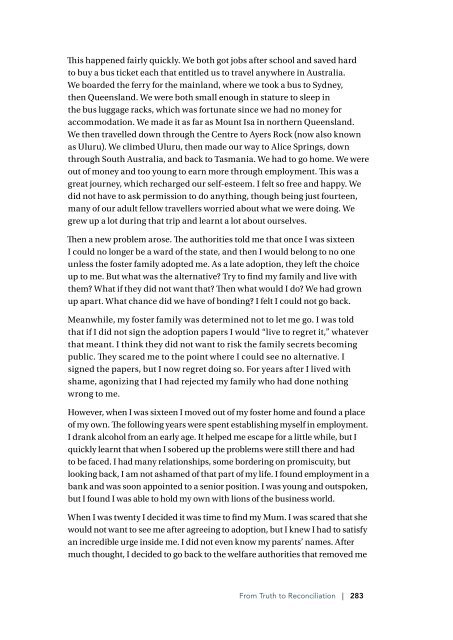Debra A. Hocking - Speaking My Truth
Debra A. Hocking - Speaking My Truth
Debra A. Hocking - Speaking My Truth
You also want an ePaper? Increase the reach of your titles
YUMPU automatically turns print PDFs into web optimized ePapers that Google loves.
This happened fairly quickly. We both got jobs after school and saved hardto buy a bus ticket each that entitled us to travel anywhere in Australia.We boarded the ferry for the mainland, where we took a bus to Sydney,then Queensland. We were both small enough in stature to sleep inthe bus luggage racks, which was fortunate since we had no money foraccommodation. We made it as far as Mount Isa in northern Queensland.We then travelled down through the Centre to Ayers Rock (now also knownas Uluru). We climbed Uluru, then made our way to Alice Springs, downthrough South Australia, and back to Tasmania. We had to go home. We wereout of money and too young to earn more through employment. This was agreat journey, which recharged our self-esteem. I felt so free and happy. Wedid not have to ask permission to do anything, though being just fourteen,many of our adult fellow travellers worried about what we were doing. Wegrew up a lot during that trip and learnt a lot about ourselves.Then a new problem arose. The authorities told me that once I was sixteenI could no longer be a ward of the state, and then I would belong to no oneunless the foster family adopted me. As a late adoption, they left the choiceup to me. But what was the alternative? Try to find my family and live withthem? What if they did not want that? Then what would I do? We had grownup apart. What chance did we have of bonding? I felt I could not go back.Meanwhile, my foster family was determined not to let me go. I was toldthat if I did not sign the adoption papers I would “live to regret it,” whateverthat meant. I think they did not want to risk the family secrets becomingpublic. They scared me to the point where I could see no alternative. Isigned the papers, but I now regret doing so. For years after I lived withshame, agonizing that I had rejected my family who had done nothingwrong to me.However, when I was sixteen I moved out of my foster home and found a placeof my own. The following years were spent establishing myself in employment.I drank alcohol from an early age. It helped me escape for a little while, but Iquickly learnt that when I sobered up the problems were still there and hadto be faced. I had many relationships, some bordering on promiscuity, butlooking back, I am not ashamed of that part of my life. I found employment in abank and was soon appointed to a senior position. I was young and outspoken,but I found I was able to hold my own with lions of the business world.When I was twenty I decided it was time to find my Mum. I was scared that shewould not want to see me after agreeing to adoption, but I knew I had to satisfyan incredible urge inside me. I did not even know my parents’ names. Aftermuch thought, I decided to go back to the welfare authorities that removed meFrom <strong>Truth</strong> to Reconciliation | 283
















